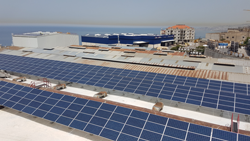The Lebanese Council of Ministers has finally concluded the licensing phase for a 180 MW solar tender involving 12 projects of equal size, with the approval of 11 licenses this week, for a total of 165 MW of new PV capacity. The 11 projects are spread across four main regions: Bekaa (including the provinces of Bekaa and Baalbek-Hermel), Mount Lebanon, South (the provinces of South Lebanon and Nabatiyeh), and North (including North Lebanon and Akkar).
Initially, the tender aimed to license 12 solar projects across these regions, and the selection process was a competitive negotiation procedure based on the lowest received tariff. However, one investor did not agree on a tariff. pv magazine has confirmed with the government that the sole 15 MW project that was abandoned during the negotiation process was from the North portion of the tender, involving the provinces of North Lebanon and Akkar.
Nevertheless, the authorities approved 11 licenses for a number of consortia. They included Ecosys-Kaco, Dawtec-Looop-Staunch and Labwe Solar Farm in the Bekaa region; Joun PV, Sibline Solar Farm and E/One in the Mount Lebanon region; South Power, Rimat 15 and Gds-Et-Nabatiyeh in the South; and Kfifane Phoenix Power Plant and Elect-Stc-Solistis in the North.
Tariffs are a key element of every tender. The design of Lebanon’s 180 MW tender allowed the government to negotiate a different tariff for each of the four tender regions (Bekaa, Mount Lebanon, South and North). The lowest bid submitted in a given region would apply to all PV projects within the same area. For Bekaa specifically, one group submitted a $0.057/kWh bid, so all three 15 MW farms had to accept that tariff.
However, Bekaa has the strongest solar irradiance of the four regions of the tender, as well as cheap land and easy-to-install plots. Therefore, it is no surprise that all remaining projects in the other three regions will receive tariffs of $0.0627/kWh. These tariffs are valid for a period of 25 years, starting from their commercial operation dates.
Bankable structures
Popular content
The Lebanese Center for Energy Conservation (LCEC) said in a press release that Lebanon’s “macro fiscal situation and the deterioration of the local currency was a key element within the negotiation procedure.” Gabriel De Lastours, who is the regional head of the European Bank for Reconstruction and Development (EBRD), told pv magazine last year that it is preparing for what happens when there is a stable government in place and Lebanon’s macroeconomic prospects improve.
“We believe investment in renewable energy is on hold until the macro-economic situation improves. [However,] we want the independent power producers model supporting the tender scheme in Lebanon to move ahead. So, one of the things we are now working on is how to develop bankable solar projects relying on a power purchase agreement backed by a government in a comparable macro-economic situation to Lebanon,” he said.
Perhaps this is why Lebanon’s government also said this week that it has agreed to disburse future generation payments for the 11 licensed projects “in accordance with the Sayrafa platform of the [Banque du Liban] and 70% in US dollars, while the remaining 30% of the amount of each payment to be disbursed in [Lebanese pounds].”
The LCEC added that “the licensees will have one year to sign a bankable power purchase agreement (PPA), then one more year to reach financial closure, and one additional year to reach commercial operation. The term of the PPA will be for 25 years following commercial operation date.” But it remains to be seen whether the agreed tariffs and structure will allow investors to implement their projects.
Lebanon formed a government on Sept. 11, 2021 – 13 months after a sudden explosion in Beirut killed more than 200 people and drove the country into a political and economic crisis. However, the government’s reforms have not kept pace with the dire economic situation on the ground, which also includes power blackouts. The country goes to the polls on May 15 for the first time since the deadly blast.
This content is protected by copyright and may not be reused. If you want to cooperate with us and would like to reuse some of our content, please contact: editors@pv-magazine.com.


1 comment
By submitting this form you agree to pv magazine using your data for the purposes of publishing your comment.
Your personal data will only be disclosed or otherwise transmitted to third parties for the purposes of spam filtering or if this is necessary for technical maintenance of the website. Any other transfer to third parties will not take place unless this is justified on the basis of applicable data protection regulations or if pv magazine is legally obliged to do so.
You may revoke this consent at any time with effect for the future, in which case your personal data will be deleted immediately. Otherwise, your data will be deleted if pv magazine has processed your request or the purpose of data storage is fulfilled.
Further information on data privacy can be found in our Data Protection Policy.